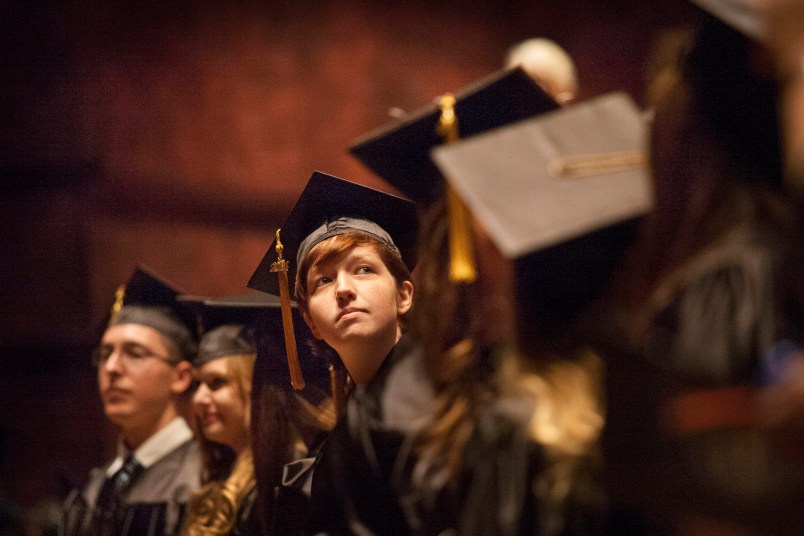The Obama Administration made waves last night with its announcement of a proposal to make two years of community college free nationwide. The idea is being called ambitious and a “potential game-changer.” And it is. But not for the reasons you might expect.
Yes, the proposal has some major asterisks (more on that in a minute) but making community college free is a powerful idea. Being able to tell a middle or high school student definitively that college can and will be affordable is a clear message that could allay many concerns about the cost of higher education. It also reduces the financial risk of not finishing college, since students who enroll, borrow, and drop out are much more likely to default on their student loans.
But the real revolutionary nature of this proposal is not what it means for the students who may save a few thousand dollars in tuition—it’s the implications for states.
At first glance, the most important number in the proposal might be $0, the tuition to students. It isn’t. The most important number is 25 percent. That’s the share of costs that the federal government would expect participating states to bear. Picking up just one-fourth of the tab is a modest ask. But it’s also a revolutionary one. That’s because, to date, the federal government has never had clear expectations for exactly what states must do to support higher education. It’s not like K-12 or special education where strict rules require states to maintain certain support or risk facing stiff financial penalties.
Instead, the federal role in higher education has entirely bypassed states in any formal role. Dollars flow to institutions through what are essentially vouchers to students. Sure, there used to be an unwritten expectation that states would play a part in this by subsidizing the operations of public colleges to keep costs down, but the only thing holding them to such a compact was the goodwill of governors and legislatures and maybe pressure from residents.
The result is nearly three decades of the wild west of higher education funding. States spent what they wanted to when they felt like it. They made big investments when times were good and took all of that and then some when times were bad. Students suffered in the form of greater tuition and more debt, but Uncle Sam never stepped in to bring law and order.
If adopted, today’s announcement changes all that. It finally creates a formal expectation for what states should contribute to help their residents afford college.
It is inarguably a modest expectation. Bearing 25 percent of the cost is not asking for much. And further caveats on the proposal will limit what that translates into in terms of dollars. States won’t have to pay for students who go less than half-time or have grade point averages under 2.5. They only have to cover one-fourth of tuition cost, not big expenses like books, transportation, and housing. States like California likely meet these tests already because community colleges traditionally have such low tuitions.
Ultimately, the importance of the expectation is not its level, but its presence. This call for free community college is drawing a much-needed line in the sand, the absence of which has had major financial ramifications for the nation’s families. It finally says to states “no more,” but in a kinder, gentler way. Such a process had to start somewhere, and community college is the place still generally affordable enough that the cost of changing this relationship quickly would be manageable. Expectations and requirements can also surely change over time. The seeds for a real higher education federalism have to start somewhere.
Free college will surely be the focus of media coverage and discussions over this proposal in the coming weeks. But it’s the entity for whom there is a clear cost—the state—that makes this idea so important.
Ben Miller is a senior policy analyst at the New America Foundation.







Another two years of great ideas that will die in Congress. Thanks, once again, to every Democrat who didn’t vote in 2010.
Which I find ironic since proposals like this are pretty much exactly what so much of the Dem base wanted.
Now, it’s guaranteed to die on the vine.
It’s a wedge issue in yet another way. If the kids and young adults who are currently going to for-profit institutions and defaulting on their loans go to community colleges instead, the net result will be less federal spending. Which you would think conservatives would applaud. Until they realize it means less federal money in the coffers of educational profiteers.
Me, I don’t blame the base. I blame the dilettantes. I blame the people who attribute their failure to vote in midterms to their hatred of politics, blind to the reality that their failure to vote in midterms is a major contributor to the things that make them hate politics.
That muffled noise you hear is TeaPubs’ heads imploding…
"Destroy our VOTING base??? Hell, No–We won’t go!
or spend money on making folks smart enough to NOT vote for TeaPols!
Or decrease profits to the Student Loan folks!"